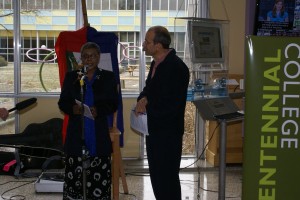 Earlier this week, I happened to be on a massage table. Because my massage therapist also happens to be one of the most plugged-in and erudite people I know, she and I talked about the devastation in Haiti. To my surprise, she informed me that Uxbridge has become involved. She said that among a number of awareness-raising and fund-raising activities, the Rotary Club of Uxbridge has rallied to assist victims of last Tuesday’s earthquake. I wondered how our community – so far away from the disaster – could hope to deliver any tangible help.
Earlier this week, I happened to be on a massage table. Because my massage therapist also happens to be one of the most plugged-in and erudite people I know, she and I talked about the devastation in Haiti. To my surprise, she informed me that Uxbridge has become involved. She said that among a number of awareness-raising and fund-raising activities, the Rotary Club of Uxbridge has rallied to assist victims of last Tuesday’s earthquake. I wondered how our community – so far away from the disaster – could hope to deliver any tangible help.
“Well, there are 17 Rotary Club branches in Haiti,” she said. “That’s how local donors can be reassured donations will get there.”
That was some of the first reassuring news I’ve learned since the earthquake took place on Jan. 12. Almost since the next day, stories of victims enduring limb amputations without anesthesia, of marauding gangs stealing from homeless victims, and of orphans roaming the streets of Port-au-Prince, have haunted all of us outside this impoverished Caribbean nation.
It’s not nearly the same, but I remember how helpless I felt when the last big California earthquake struck in 1970. At the time, my mother and sister lived a few kilometres from the epicentre in the San Fernando Valley. For a time, there were no communications either in or out of the area. My father and I – here in Canada – had no way of knowing how they were affected. The greatest relief was that first telephone connection to know they’d experienced a lot of rocking and rolling, but the only damage sustained were cracks in the walls of the house. Unlike Haiti, in California help was moments away.
Then, this week, as Canadian officials announced that 2,000 members of the Royal 22nd Regiment (the Vandoos) were being dispatched from Valcartier, Quebec, with humanitarian aid, the Haiti earthquake touched me again.
As some of you know, I teach journalism at the downtown campus of Centennial College on Carlaw Avenue, just off the Danforth. Our communications school shares facilities with the Toronto campus of College Boréal. Most of its instruction is conducted in French. On Tuesday, I bumped into Bululu Kabatakaka, the director of the college’s cultural integration program. He told me that of its 160 students in Toronto, College Boréal has two faculty members, two support staff and a dozen students all originally from Haiti. I asked the director what he’d heard from them.
Bululu told me that one of his instructors, a 30-year-old professor of law, told him her family in Port-au-Prince had survived, but their house had not. They had nothing and were literally left to fend for themselves in the streets. A second professor of social services also had family in the capital city, but the quake had killed most of them. And then he described his twelve Haitian students.
“They’ve disappeared,” he said. “ Since the quake they haven’t come back to classes. We’ve tried to call and comfort them, but they seem to have lost all hope.”
I asked Bululu if his work or travels had ever taken him to Haiti. He said it had. Originally from the Congo, he said some of his colleagues had taken their skills and talents to Haiti to teach and guide young people there. I asked him what the country looked like before the quake. He described the palace, the large hotels, the government buildings in downtown Port-au-Prince. They he paused and said he’d heard from a friend who’d come through the quake.
“The places you visited,” his friend said, “they’re all gone. They don’t exist anymore.” And Bululu said he just sat down and cried.
Moved by the losses his college faculty and students have suffered, we quickly arranged our own fund-raiser for the next day. Our joint Centennial College/College Boréal event quickly attracted speakers, silent auction items, entertainment and yours truly (the MC) to rally ’round the Haitians in our midst. Of course, it would never bring back lost family or the cityscapes of Port-au-Prince. But it did offer everybody an outlet for grieving and tangible support for the victims in our midst.
“The disaster is closer than you think,” Bululu pointed out.
Before I left my massage therapist this week, I wondered out loud how funds given to the Rotary Club of Uxbridge might be used to assist Haitians with a million and one needs right now. She told me she understood that Uxbridge donations would go directly to those local branches in Haiti, to deliver medical assistance, to begin reconstruction of lost homes and schools and to dig new wells.
Like the disaster, relief is closer than you think.